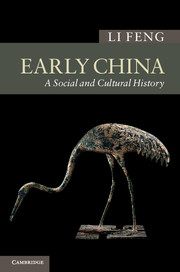Book contents
- Frontmatter
- Contents
- List of Figures
- List of Maps
- Preface
- Chronology of Early China
- Map
- 1 Introduction: Early China and its natural and cultural demarcations
- 2 The development of complex society in China
- 3 Erlitou and Erligang: early state expansion
- 4 Anyang and beyond: Shang and contemporary Bronze Age cultures
- 5 Cracking the secret bones: literacy and society in late Shang
- 6 The inscribed history: the Western Zhou state and its bronze vessels
- 7 The creation of paradigm: Zhou bureaucracy and social institutions
- 8 Hegemons and warriors: social transformation of the Spring and Autumn period (770–481 BC)
- 9 The age of territorial states: Warring States politics and institutions (480–221 BC)
- 10 Philosophers as statesmen: in the light of recently discovered texts
- 11 The Qin unification and Qin Empire: who were the terracotta warriors?
- 12 Expansion and political transition of the Han Empire
- 13 State and society: bureaucracy and social orders under the Han Empire
- 14 Ideological changes and their reflections in Han culture and Han art
- Index
- References
1 - Introduction: Early China and its natural and cultural demarcations
Published online by Cambridge University Press: 05 June 2014
- Frontmatter
- Contents
- List of Figures
- List of Maps
- Preface
- Chronology of Early China
- Map
- 1 Introduction: Early China and its natural and cultural demarcations
- 2 The development of complex society in China
- 3 Erlitou and Erligang: early state expansion
- 4 Anyang and beyond: Shang and contemporary Bronze Age cultures
- 5 Cracking the secret bones: literacy and society in late Shang
- 6 The inscribed history: the Western Zhou state and its bronze vessels
- 7 The creation of paradigm: Zhou bureaucracy and social institutions
- 8 Hegemons and warriors: social transformation of the Spring and Autumn period (770–481 BC)
- 9 The age of territorial states: Warring States politics and institutions (480–221 BC)
- 10 Philosophers as statesmen: in the light of recently discovered texts
- 11 The Qin unification and Qin Empire: who were the terracotta warriors?
- 12 Expansion and political transition of the Han Empire
- 13 State and society: bureaucracy and social orders under the Han Empire
- 14 Ideological changes and their reflections in Han culture and Han art
- Index
- References
Summary
“Early China” refers to a long period from the beginning of human history in East Asia to the end of the Eastern Han Dynasty in AD 220, a date that is often, though imprecisely, used to mark China’s entry into the Buddhist Era. As the initial period that gave the Chinese civilization much of its foundation, Early China has always served as the gateway to China, by offering a series of essential lessons in government, social practice, art, religion, and philosophical thought, necessary for students of all periods of Chinese history. But in a more general sense, if history is the best way to teach about a culture in which people live, it is perfectly natural that knowledge of Early China can provide what is often the most fundamental explanation of aspects of the social life in modern China and of its underlying values. As a field of research, Early China Studies is one of the areas that have most dramatically benefited from the advancement in modern academia, particularly in the discipline of archaeology which has been renewing daily our understanding of China’s distant past. It is also a field that has seen occasional interplay between politics and scholarship, and that has been much shaped by different national or international traditions.
To begin our journey into this distant past, below I will first introduce the natural and temporal settings of Early China as necessary for understanding the social and cultural developments soon to be discussed in this book. For the same purpose, the chapter will then turn to a brief discussion of the process by which Early China Studies has emerged as a modern academic field, and the state of the field will alert the reader to the need not only to see the past, but also to understand the different ways in which it was seen and interpreted.
- Type
- Chapter
- Information
- Early ChinaA Social and Cultural History, pp. 1 - 14Publisher: Cambridge University PressPrint publication year: 2013



